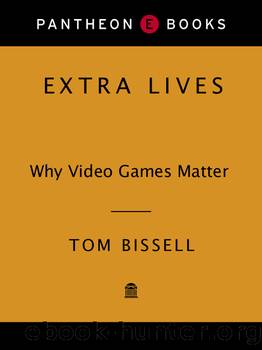Extra lives: why video games matter by Tom Bissell

Author:Tom Bissell [Tom Bissell]
Language: eng
Format: epub
Tags: Humour
ISBN: 9780307378705
Published: 2010-06-08T11:05:17+00:00
SEVEN
Godforsaken is often used to describe the worldâs woebegone landscapes. But to say that God has forsaken something, there must be some corresponding indication that God had ever shown any interest in it, and, in the case of Edmonton, Alberta, this was not immediately apparent. On the evening of my arrival, at least, the temperature was close to the magic intersection at which Celsius and Fahrenheit achieve subzero parity. I was in Edmonton to see Drew Karpyshyn, the head writer of BioWareâs Mass Effect, a science-fiction role-playing game that some have held up as one of the best-written console video games of all time.
There is a nontrivial divide separating the relative achievements of console and PC games in any number of areas, but how âwell writtenâ console games are when compared with PC games, which have historically been more text-heavy, is especially contentious. Among the PC gamers of my acquaintance, Black Isle Studiosâ RPG Planescape: Torment is often cited as being more thought provoking and literarily satisfying than any console game. In this respect, BioWareâs console games have an instantly recognizable style: that of seeming like PC games (a famously persnickety and piracy-plagued market that BioWare, unlike many developers, has not abandoned). What distinguishes the BioWare style is an unshakable reliance on dialogue and narratives with all manner of bureaucratic complication. What also distinguishes the BioWare style is gameplay longevity: I have had moderately meaningful relationships in which I invested less time than what I have spent on some BioWare games.
All of BioWareâs titles have been RPGs of one stripe or another, with an early concentration on the dungeon fantasia, an RPG subgenre that is extremely difficult to do well and virtually impossible to sell beyond its niche audience. The first BioWare title to move beyond the cleric-and-dwarf sodality was 2003âs Star Wars: Knights of the Old Republic (known, in vaguely Neanderthal vernacular, as KotOR), which is set four thousand years before the events lamentably depicted in The Phantom Menace. With KotOR, BioWare was in danger of simply swapping one shut-in constituency for another, but it was a game of such narrative super-bity that even nonâStar Wars fans took note. While the care the game lavished on the Star Wars universe was considerable, the way KotOR handled dialogue indicated a solidifying methodology. Here, as in the later Mass Effect, almost every conversation and encounter initiated by the gamer can lead to multiple and often drastically different outcomes, some of which bring you in line with the Force, some of which tempt you down the path of the dark side of the Force. The game changesâas does your characterâs appearanceâdepending on where he or she falls along a spectrum of in-game morality. Although open-ended conversation may sound like a relatively simple game mechanic, when it is done well that is most assuredly not the case. The technology BioWare uses to manage in-game dialogue is closely minded, and parts of it are patented. No one, then, makes more conversationally driven console games than BioWare.
Download
This site does not store any files on its server. We only index and link to content provided by other sites. Please contact the content providers to delete copyright contents if any and email us, we'll remove relevant links or contents immediately.
| Antennas | Microwaves |
| Mobile & Wireless | Networks |
| Radar | Radio |
| Remote Sensing & GIS | Satellite |
| Signal Processing | Telephone Systems |
| Television & Video |
Whiskies Galore by Ian Buxton(42000)
Introduction to Aircraft Design (Cambridge Aerospace Series) by John P. Fielding(33122)
Small Unmanned Fixed-wing Aircraft Design by Andrew J. Keane Andras Sobester James P. Scanlan & András Sóbester & James P. Scanlan(32797)
Craft Beer for the Homebrewer by Michael Agnew(18238)
Turbulence by E. J. Noyes(8042)
The Complete Stick Figure Physics Tutorials by Allen Sarah(7369)
The Thirst by Nesbo Jo(6937)
Kaplan MCAT General Chemistry Review by Kaplan(6930)
Bad Blood by John Carreyrou(6617)
Modelling of Convective Heat and Mass Transfer in Rotating Flows by Igor V. Shevchuk(6435)
Learning SQL by Alan Beaulieu(6283)
Weapons of Math Destruction by Cathy O'Neil(6270)
Man-made Catastrophes and Risk Information Concealment by Dmitry Chernov & Didier Sornette(6013)
Digital Minimalism by Cal Newport;(5751)
Life 3.0: Being Human in the Age of Artificial Intelligence by Tegmark Max(5551)
iGen by Jean M. Twenge(5409)
Secrets of Antigravity Propulsion: Tesla, UFOs, and Classified Aerospace Technology by Ph.D. Paul A. Laviolette(5370)
Design of Trajectory Optimization Approach for Space Maneuver Vehicle Skip Entry Problems by Runqi Chai & Al Savvaris & Antonios Tsourdos & Senchun Chai(5067)
Pale Blue Dot by Carl Sagan(5002)
